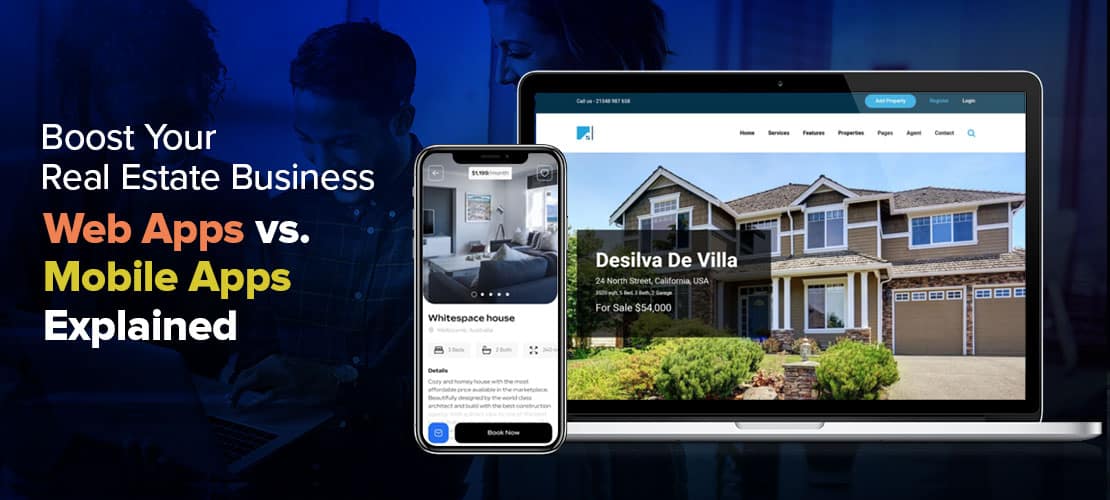
- August 16, 2024
- Reading time about 7 minutes
The present-day real estate market calls for digitalization. Adopting technology is no longer a choice but a requirement. With more than 90% of homebuyers in the United States starting their property search online, digital tools are one way to connect a real estate agent with clients. The real dilemma for real estate business, though, comes with the many tech options available: should you focus on web development, or is investing in real estate mobile app development the better move?
The choice is not that simple. A perfectly crafted web application can provide a wide reach and attract a large audience. On the other hand, a mobile application can offer personalization and on-the-move experiences that can retain the interest of clients. All have pros, but only one key can fit into your business goals. With real estate website builders proving their utility for real estate agents, the confusion only gets denser.
In this blog, we’ll break down the differences between the two so that you can know which suits your needs as a real estate business.
Target Audience and Their Needs
It’s all about knowing your audience and what they need: a mobile app or a web app for their real estate business.
Mobile apps really are convenient for real estate enterprises and larger broker teams. Such apps are designed to offer a tailored experience, facilitating regular engagement with customers and making the most of the features of the device. Think of clients who could be using GPS to try and locate properties in a nearby area, receiving push notifications instantly on new listings, and even taking virtual tours right from the camera on their phone. A mobile app can be the difference that will move you in the right direction—where most of your clientele will automatically expect seamless interaction with real-time updates. BidHom’s enterprise solution is a perfect match for mid-to-large-sized businesses.
On the other hand, if you are a small agent or an independent broker who wants to have some digital presence without breaking the bank, you are probably better off with an app. For just $99 per month, you can have a full-fledged web app and website with BidHom that your clients can log into from any device with a web browser. They will not have to download an application to be able to search through the listings, make viewing schedules, or contact you directly. This is an easy and effective way to reach out to a wider audience without the huge expense.
Being aware of your clients and how they are likely to interact with your service will help identify your business’s best-fitted digital solution.
User Experience and Performance
Regarding user experience, mobile apps are usually at an advantage. Since they are installed directly on the device, they can take advantage of local storage and the device’s capabilities, be faster, and have smoother performance. This setup proves especially beneficial in handling resource-intensive tasks such as streaming or interactive features, thus making mobile applications an ideal choice in cases where clients need a smooth and responsive experience.
On the other hand, web apps provide flexibility and accessibility but sometimes might lag due to their nature, which is connectivity-dependent and browser-dependent. In this case, speed and responsiveness are proportional to user connectivity and the performance of their browser. Technologies like PWAs are filling up this gap by getting the best from both worlds. PWAs can give app-like experiences in a web browser by making a website perform more like a mobile app, with better performance and offline capabilities, hence bridging the gap in performance between traditional web apps and mobile apps.
Offline Functionality
The great advantage of mobile applications is that they can maintain offline functionality by storing data locally in the device. In this regard, a user can access and interact with the application features without internet connectivity. This aspect is of great importance to real estate apps, where a client may need to access property details or do a search in an area with poor internet coverage.
On the other hand, web apps normally require an internet connection to use. While Progressive Web Apps (PWAs) of course seek to change that, with a little bit of offline functionality through data caching, traditional web apps have no such feature up their sleeve. While traditional web apps would hit a wall, PWAs can store certain data locally to offer a more reliable experience, even if there isn’t constant access to the internet.
The technicalities of developing a web app can be easily taken out by leaving the work to an advanced real estate website builder like BidHom.
Security and Privacy
Security and privacy are, once again, also some domains in which mobile apps outshine due to the strong support of app store review processes, enabling them to have superior security measures, such as biometric authentication—a step strongly making sure of the privacy of user data and other securities within the app put in place.
Even though web apps have the option of having strong security, this cannot fully protect them from web application security practices and, more so, web-based vulnerabilities like cross-site scripting (XSS) and SQL injection. Security best practices include keeping data secure, regularly updating, and ensuring that data is strongly encrypted.
Imagine investing in a real estate auction platform that helps you build your website and go live with all compliance requirements met. You don’t have to get into the nitty-gritty of security requisites when you choose to go digital with BidHom.
Market Presence and Branding
Mobile apps provide a gigantic boost to your brand’s visibility: just by being on your target customers’ mobile home screens. They also come with a direct marketing channel through which updates, promotions, or new listings can be brought to your customer through push notifications.
Web apps or websites give a consistent user experience and design on all devices. Every time one of your clients visits your site, your brand identity is constantly being communicated. When you build your real estate agent website with BidHom, you get full control over how your website feels and looks. With a variety of templates to choose from, an easy dashboard to manage the content, and super-easy marketing options, BidHom makes branding a breeze.
Final Remarks
Your decision of choosing between a web app and a mobile app depends on your business size, goals, and what exactly your clients need. BidHom’s $99/month listing plan will set the small agents or brokers on the path to making an impact without a large investment, bringing in a strong, accessible digital presence. On the other hand, large real estate business and teams looking to provide extremely personalized, fast, and full-featured experiences to their clients can find a perfect haven in BidHom’s enterprise plan.
BidHom is an emerging real estate website builder that allows real estate agents to build their online presence most cost-efficiently. For a real estate business with greater operational efficiencies, we have enterprise solutions that can be tailored to your requirements. Our tech support is robust and can meet your requirements pertinently.
Want to know more about how BidHom can streamline your real estate mobile app development? Get in touch with us.


